Contact Us
Rheumatology Fellowship
Explore This Fellowship
Overview
The goal of the Massachusetts General Hospital Rheumatology Fellowship Training Program is to train physicians for the independent practice of rheumatology as clinicians, clinician educators or clinician scientists.
The Rheumatology Fellowship Training Program is a fully ACGME-accredited two-year training program. We provide fellows with an environment fostering a precepted but self-directed learning program that will lead to highly capable clinical rheumatologists in association with mentored research training. Additionally, each fellow is provided opportunities for teaching, with faculty feedback provided, training the fellow to become an educator in the field of rheumatology for all levels of learners.
The mission of the Rheumatology Fellowship Program is to produce a physician who:
- Is clinically competent in the field of rheumatology
- Delivers patient-centered, safe, timely care
- Works collaboratively in a variety of settings as a member of an interprofessional health care team
- Is knowledgeable about and skilled in research techniques
- Can provide a critical appraisal of the literature and discuss outcomes research
- Demonstrates a high level of professionalism
- Possesses habits of life-long learning to build upon his/her knowledge, skills and professionalism
The teaching methods are experiential, didactic and reflective. Fellows have significant responsibility for patient evaluation and care in both inpatient and outpatient settings where teaching and supervision are provided by Rheumatology faculty. These clinical experiences are complemented by didactic conferences focusing on clinical and basic science aspects of rheumatology and immunology, bone and joint radiology, pathology, as well as the roles of orthopedics, rehabilitation medicine and other specialties in the care of our patients.
The philosophy of the Rheumatology Fellowship Training Program is to provide the fellow with the resources necessary to undertake a self-directed learning program that will lead to high-level competence in clinical rheumatology and mentored research training. Additionally, the fellow will obtain training in becoming an educator to prepare him/her to progress to the next step in providing medical education to all levels of learners.
Mass General is an extraordinary environment for fellowship training, as the patient population is varied, the spectrum of disease is remarkable and the expertise of physicians, fellows and residents is nationally and internationally recognized. In addition to rheumatology faculty, leading physicians from the Allergy and Immunology Unit and the Departments of Orthopaedics, Neurology, Pediatrics, Dermatology also participate in the training program. As a fellow of Harvard Medical School, trainees benefit from the extensive teaching activities and resources available within Harvard Medical School.
Welcome Message and Program Highlights
Contributing Programs and Related Resources
- Mass General Internal Medicine
- Mass General Dermatology
- Mass General Neurology
- Mass General Orthopaedics
- Mass General for Children (Pediatrics)
- Mass General Pathology
- Mass General Radiology
- Harvard Medical School
History
The Mass General Rheumatology Fellowship Training Program, established in 1929, had its origin with the late Walter Bauer, MD, who brought basic scientists into the hospital to work side-by-side with clinicians. Dr. Bauer emphasized pathology as the major scientific discipline since he thought that pathology would provide the background for detailed observation and description of these diseases. A definitive description of the clinical picture and pathology of rheumatoid arthritis resulted from this approach.
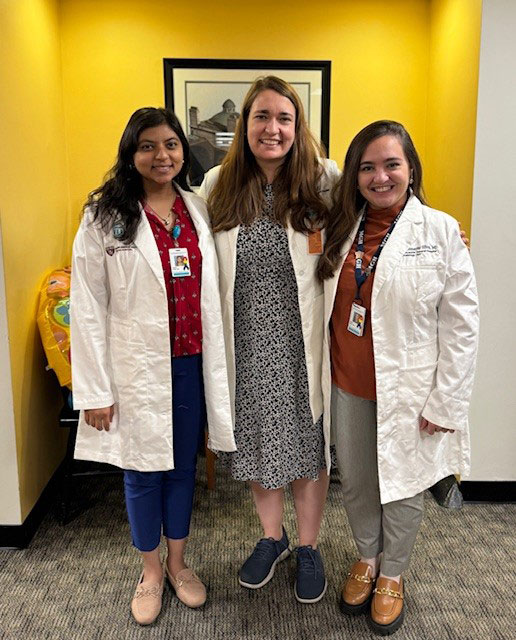
Succeeding Dr. Bauer, Marian Ropes, MD, one of the first women division chiefs in the nation, guided the Mass General Arthritis Unit to publish definitive studies on the major rheumatic diseases in both the clinical and basic sciences.
In 1961, Stephen Krane, MD, became chief of the Rheumatology Unit. Dr. Krane established a tradition of excellence in connective tissue and matrix biology, incorporating the modern techniques of cell and molecular biology.
In 2000, Andrew D. Luster, MD, PhD, was appointed the chief of a new Division of Rheumatology, Allergy and Immunology (DRAI). This division includes the former Allergy and Clinical Immunology Unit and the former Arthritis Unit. The impetus for this new initiative was to develop a division within the Department of Medicine that would focus on the immunologic and inflammatory basis of human disease. To accomplish this goal, the Center for Immunology and Inflammatory Diseases (CIID) was established, as part of the DRAI, to serve as the basic and clinical science foundation for the clinical Departments of Rheumatology, Allergy and Clinical Immunology. Dr. Luster is also the Director of a NIH-sponsored training program in Rheumatology research at Mass General, which has expanded under his guidance.
Dr. Luster has put in place a leadership team that includes Sara Schoenfeld, MD and Mark Matza, MD, MBA, co-clinical directors of rheumatology, who oversee all clinical activities of the unit. Marcy B. Bolster, MD, the fellowship training program director, coordinates all teaching and training-related activities. Research leadership includes John Stone, MD, MPH, director, clinical trials research; Hyon Choi, MD, DrPH, director, clinical epidemiology; and Allen Steere, MD, director, translational research. And, together, they coordinate clinical and translational research between the clinic, the Mongan Institute and the laboratories in the CIID.

The ACR Distinguished Program Director Award (left: Marcy Bolster) and one ACR Distinguished Fellow Award (right: Mazen Nasrallah), ACR Annual Meeting, 2019.
Dr. Marcy B. Bolster has held the role of director, Mass General Rheumatology Fellowship Training Program since 2012. Dr. Bolster has devoted her career to the training of rheumatology fellows, internal medicine residents and medical students. She values the importance of mentorship in her own professional development as well as through her commitment to sharing her dedication to patient care and education in the rheumatic diseases with learners at all stages of training. She has helped to train over 50 rheumatology fellows.
Dr. Bolster has held leadership roles in ACR curriculum design and assessment, ACGME Milestones and the ABIM Rheumatology Exam Committee (Chair, ABIM Rheumatology Exam Committee, 2014-2018). She has served as chair, ACR Committee on Training and Workforce (COTW, 2012-2015) and had a leadership role in the graduate medical education (GME) component of the ACR Adult Rheumatology Workforce Study (2015). Dr. Bolster received the award of ACR Distinguished Program Director (2019) and Mass General Brigham (MGB, formerly Partners Healthcare System) Program Director of the Year (2020).
Requirements
Rheumatology fellowships are offered to MDs who have completed three years of post-graduate training in internal medicine or two years under the ABIM Research Pathway. All applicants are expected to be board-eligible in internal medicine when beginning the Rheumatology Fellowship Training Program unless in the ABIM Research Pathway. It is expected that all rheumatology fellows will have passed USMLE I, II and III as requirements of training.
Details regarding certification for ABIM candidates may be found on the ABIM website.
Mass General is an Equal Opportunity Employer and welcomes applications from all candidates.
Two years of fellowship (one clinical and one research year) are required for completion of the ACGME Rheumatology training and for ABIM Rheumatology Board certification; fellows may take the Board certification examination after two years of fellowship. However, the NIH-sponsored training program requires a three-year fellowship with two years of research training (a second and third year of fellowship). In addition to the first clinical year, it is expected that fellows will spend at least two additional years in clinical or laboratory research to develop their scientific skills.
Curriculum
Clinical Conferences
The program director creates a monthly schedule of rheumatology conferences based on a 24-month educational experience. There is a robust conference schedule to complement the clinical and research training in the program.
Rheumatology Grand Rounds
Weekly Rheumatology Grand Rounds are held on Tuesday mornings. Faculty members from Mass General or other Boston hospitals, or other nationally or internationally recognized speakers present at this conference.
Case Conference
Case Conference is held approximately six times per year. This conference is led by one rheumatology fellow who presents two cases. The fellow leads the audience through the clinical presentation, highlighting the key historical and objective features of the case and discusses the differential diagnosis. A formal discussion of the disease is led by the fellow based on the current medical literature.
Fellows’ Report
The clinical fellows meet weekly with two faculty members. The fellows present cases recently seen in the outpatient clinics or on the Consult Service for discussion with two faculty members. The group uses a white board approach to discuss patient evaluation and management as well as to foster critical thinking.
Journal Club
This conference is held monthly and is led by the fellows. Each Journal Club involves the discussion of two journal articles related to a topic, and the articles are selected by a faculty member. The faculty member selects one current article as well as one “landmark” article to pair with the recent article. Each fellow is expected to read and critically appraise each article prior to conference. The objectives of this conference are to review current clinical literature in rheumatology and to develop skills in appraising the medical literature.
Medical Grand Rounds
On Thursday mornings, fellows are encouraged to attend Medical Grand Rounds at Mass General. The speakers include Harvard Medical School faculty, Boston-area faculty, Mass General Internal Medicine chief residents and other nationally and internationally recognized faculty covering a broad area of clinical and basic science topics. New England Journal of Medicine CPCs are also presented during Medical Grand Rounds.
Mills Rounds
Mills Rounds are held three to four times per year. John Mills, MD is an emeritus professor and rheumatology faculty member at Mass General. All fellows and faculty are encouraged to bring challenging cases for discussion with Dr. Mills. Typically, the cases presented represent patients being seen by the inpatient consult team, and the presentations are made by the faculty consult attending. This method provides many unique educational opportunities, including enabling the fellows to learn from faculty presentations of patient cases, and obtaining a perspective of patient evaluation and critical thinking enriched by Dr. Mills’ many years of patient care and teaching experience.
Musculoskeletal Ultrasound Conference
Musculoskeletal Ultrasound (MSUS) Conference is held six times per year and is led by Minna Kohler, MD, Mark Matza, MD, and Janeth Yinh, MD. The learning objectives for this conference include:
- Distinguishing the indications for MSUS
- Hands-on experience with MSUS for the knee, hand/wrist, elbow, shoulder, ankle/foot and hip
- Recognizing basic ultrasound anatomy
- Integrating basic concepts of ultrasound image optimization
Pathology Conference
Pathology conference is a conference that meets two to four times each year to review cases submitted by rheumatology faculty and fellows. The discussion includes the clinical presentation of the patient and the pathologic findings of the tissue specimen.
Professors’ Rounds (Evidence-Based Medicine Conference)
Professors’ Rounds is a monthly conference for one rheumatology faculty member (rotating) with the fellows. The topics are based on the “Theme of the Month,” each month representing a different topic area within rheumatology divided over a two-year training period, to enhance learning in each of these key rheumatology areas. The fellows present one to two cases for discussion of general rheumatology based on the “Theme of the Month.” The faculty member leads an interactive discussion of the clinical presentation and patient management including the differential diagnosis in an evidence-based manner. This conference is attended by fellows only.
Radiology Conference
The Radiology Conference is held monthly. The goal of this conference is to teach the fellows important aspects of imaging and the diagnosis of arthritis and musculoskeletal diseases. X-rays, CT scans and MRI images are presented. Fellows and faculty are expected to submit one to two X-rays to the conference for presentation and discussion. Areas covered include the radiographic features of RA, spondyloarthropathy, OA, systemic vasculitis, crystal-induced arthropathy, avascular necrosis, infection and regional musculoskeletal disorders such as rotator cuff syndrome and internal derangement of the knee.
Research Conference
The Center for Immunology and Inflammatory Diseases (CIID) Immunology Seminar is held weekly at the Charlestown Navy Yard and is available for viewing by videoconference from the Bulfinch 165 Conference room. The talks are given by guest faculty who are nationally recognized in their fields and present elite and elegant research work.
Rheumatology Bread ‘N Butter Conference
The Bread ‘N Butter Conference is held once a month. This conference is coordinated by the Program Director and covers topics that are needed to supplement and complete the rheumatology curriculum. This conference is attended by fellows only.
Rheumatology Faculty Research Conference
Faculty Research Conference occurs four to five times per year. The presentations are given by Rheumatology faculty members related to their ongoing research interests and discoveries.
Wallace Journal Club
Wallace Journal Club is directed by Zachary Wallace, MD, MSc. It is held twice each month. One fellow leads the discussion, which is a review of one of the current high impact rheumatology journals, including Arthritis and Rheumatology and Annals of Rheumatic Disease. The fellow selects six to eight articles to review with the group in a “rapid-fire” format such that the abstract and figures are discussed as well as any other key points in the critical review of the article. One related landmark article is also selected to review.
Inter-hospital Rounds
Inter-hospital Rounds are a tradition for the Boston rheumatology training programs. The conference is held once monthly at one of the Boston teaching institutions. The fellows from the host institution present one case per fellow. The selection of cases typically reflects some of the more challenging diagnostic cases and/or unusual diseases seen by the fellow at his/her institution. The presentations are preceded by dinner.
Eli Miloslavsky, MD, discusses Medical Education.
Teaching Opportunities
Teaching opportunities for fellows are both informal and formal. The fellow trainee, in interacting with the medical students and internal medicine residents seeing patients on the Consult Service, has a great opportunity for practical, ad hoc teaching on a wide variety of topics as guided by the patient presentations encountered. The fellow is expected to provide feedback to the residents and medical students regarding the patient evaluation and to oversee the patient presentations to the attending rheumatologist. The rheumatology fellows benefit from training within the Fellow as Clinical Teacher (FACT) curriculum.
Teaching skills to educate patients and families are developed by direct clinical experience. Each patient encounter in the continuity clinic setting and on the inpatient Consult Service is supervised by a rheumatology faculty member. The patient care plan is discussed in detail between the fellow and faculty member. Patient and family education are provided in one of many ways including discussion with the faculty member (observed interaction by the fellow), discussion by the fellow (observed by the faculty member) and/or discussion by the fellow after having created a plan in concert with the faculty member. Immediate feedback is provided by the faculty member to fellow (supervised clinical experience, direct observation).
Clinical Experience
The first year of the program is designed to provide in-depth clinical training in all aspects of clinical rheumatology, including critically-ill patients in the hospital, as well as common rheumatic disorders and diagnostic dilemmas in the inpatient and outpatient settings. Because of the large number of clinical faculty who participate in the program, trainees are introduced to different approaches by the various faculty members, each with his/her own clinical and research strengths. The second year of the fellowship training program provides the opportunity for focus on research training while permitting continued longitudinal outpatient care and inpatient consultative clinical training. For those fellows wishing to pursue a career in clinical practice, the second year of fellowship training is enriched in clinical experiences. The Mass General Rheumatology Fellowship Training Program prides itself on providing an individualized training experience to optimally train each fellow.
A strong commitment is made to hands-on training by the preceptor, whose time is reserved for that purpose in both the inpatient and outpatient settings. Guided by the ACGME, fellows comprehensively master the six core competencies.
Inpatient Experience
First-year clinical fellows are responsible for seeing inpatient rheumatology consultations at Mass General and Mass Eye and Ear (approximately 75-100 per month) on a two-week rotational basis. After conducting a patient consultative evaluation, fellows review their findings and treatment plans with the faculty attending. In addition, the trainees oversee the internal medicine residents and medical students rotating on the rheumatology service. Mass General has long been recognized as a national and international leader in the care of patients. People of all socioeconomic standings come here from local, regional, national or international locations. Therefore, there is exceptional diversity in the spectrum of rheumatic diseases, which includes rare and difficult cases. This diversity and complexity are represented in the case conferences published in the New England Journal of Medicine. In addition to the Mass General rotations, each fellow spends two weeks on the rheumatology consultation service at the Brigham and Women’s Hospital, our sister institution in the Mass General Brigham hospital system (formerly, Partners Healthcare System). The second-year fellows maintain one to three half-day continuity clinics and rotate on the inpatient rheumatology consult service for two 2-week blocks per year. Thus, the majority of the inpatient consultations are seen and cared for by the first-year rheumatology fellows.
Outpatient Experience
Since rheumatology is primarily an outpatient specialty, experience in the outpatient rheumatology clinic is an important focus of our fellowship training. Each year, the faculty and fellows see over 12,000 patients in the clinics. Clinical training of Mass General rheumatology fellows occurs predominantly at Mass General. There is an emphasis on clinical training in the first year. We have developed a schedule with a 3-week cadence for our three first-year fellows. The first-year fellows have, on average, three half-day continuity clinics per week, and they rotate on the inpatient Consult Service for 22 weeks in a shared role between two of the fellows (Fellows A and B). One week in each 3-week rotation comprises an outpatient experience (Fellow C; 4 half-days of continuity clinic per week, including one subspecialty clinic in Musculoskeletal Ultrasound, Rheumatology/Dermatology, and Osteoporosis Clinics). The second-year fellows have an eight-week exposure to pediatric rheumatology by rotating in the Mass General Pediatric Rheumatology Outpatient Clinic with a preceptor, Holly Rothermel, MD. While on the Inpatient Consult Service the two first-year fellows continue with longitudinal outpatient clinic (one half-day weekly) and otherwise provide clinical inpatient consultation care with a faculty member.
Research Preparation
The first-year rheumatology fellows gain exposure to DRAI research opportunities by several mechanisms. All first-year fellows, during the first six months of fellowship training, are encouraged to meet with research faculty to discuss ongoing research projects, mentorship and potential opportunities for fellow participation and investigative work. The DRAI hosts an Introduction to Research session early in the first year of training to introduce fellows to the different faculty involved in clinical epidemiology, medical education, clinical trials, basic science and translational research.
Clinical epidemiology research exposure begins during the first year of training as fellows are included in the DRAI Clinical Epidemiology Program’s monthly Clinical Research in Progress meeting. At this monthly meeting, rheumatology and allergy fellows and some junior faculty present ongoing work on abstracts, grant design, manuscript and talk preparation. First-year fellows interested in clinical epidemiology research have the opportunity to present towards the end of Year 1. Faculty from the DRAI Clinical Epidemiology Program attend and often invite outside faculty to participate depending on topics being discussed. The first-year fellows are mentored closely by Drs. Yuqing Zhang, Zach Wallace and Hyon Choi to have early involvement in clinical outcomes research with many of the fellows presenting one or more abstracts at the ACR meeting as second-year fellows, reflecting abstracts being submitted to the meeting during the first year of fellowship training. This exposure provides a strong foundation for a fellow’s subsequent clinical research focus.
Fellows interested in medical education research are encouraged to engage in ongoing opportunities in the DRAI, Department of Medicine, and institutional activities during their first year of training, and these interests can be further supported and developed in subsequent years of training.
Similarly, clinical trials work, and basic and translational science projects can be considered and planned during the first year of fellowship training; however, these projects require a deeper commitment of time and become more fully developed in subsequent training years.
Second-year fellows have a strong focus on their research training, and although only two years of training are required by the ACGME, many fellows at Mass General elect to train for three or more years in order to enrich their research training component. Fellows in their second year of training spend less time in the outpatient clinic and on the inpatient Consult Service: one to three half days per week in the clinic and two to four weeks per year on the Consult Service. The amount of time spent in the outpatient clinic and on the inpatient consult service is tailored to individual educational needs based on the fellow’s research project; those involved in bench science research will spend less time in the clinical setting whereas those involved in clinical research will have more outpatient exposure with an emphasis on patients in clinic with the disease process being studied.
Related Links
- Mass General Department of Medicine Clinician Educator Program for Fellows
- Brigham and Women’s Hospital Department of Rheumatology
- Mass General for Children Rheumatology Service
- Mass General Center for Systems Biology
- Mass General Cancer Center
- Mass General Center for Human Genetics
- Mass General Center for Regenerative Medicine
- Mass General Center for Computational Biology
- Ragon Institute of MGH, MIT & Harvard
- Broad Institute
- Harvard Medical School
April Jorge, MD, discusses the benefits of training at Massachusetts General Hospital and pursuing a clinical research career.
Dr. Cory Perugino - Mass General Rheumatology Fellowship: Basic Science Investigation
Research Experience
Second and Third Year
The goal of the second and third years of the fellowship training program is to expose fellows to rigorous scientific training in immunology and/or rheumatic diseases. This is accomplished through an individualized program of laboratory or clinical research, under the guidance of a mentor from the rheumatology faculty, along with structured training in immunology, molecular biology, genetics, clinical epidemiology and biostatistics, clinical trial design, and/or ethics through courses, conferences and hands-on experience. At the same time, maturation of clinical judgment is fostered through continued participation in continuity clinics and clinical conferences. The research portion of the fellowship is supported by a Rheumatology Training Grant from the National Institutes of Health.
The primary laboratory research component of the Division of Rheumatology, Allergy and Immunology is the Center for Immunology and Inflammatory Diseases, which is directed by Andrew D. Luster, MD, PhD, Division Chief. Research in the center focuses on the elucidation of immune and inflammatory responses in autoimmune and inflammatory diseases. Areas of particular interest include basic and translational research in autoimmunity, tolerance, chemokine and cytokine biology, leukocyte trafficking, mucosal immunity, single cell genomics and multiphoton live cell imaging. During the research years, fellows participate in the weekly laboratory meetings and journal clubs of the laboratory in which their project is being done. In addition, once a month, all members of the laboratories in the CIID gather for presentations of current research by fellows or faculty.
The Clinical Epidemiology Program of the Division of Rheumatology, Allergy, and Immunology is where fellows interested in advanced clinical epidemiology, biostatistics, and other methods pursue research training. Our Clinical Epidemiology Program is directed by Hyon Choi, MD, DrPH (Rheumatology) and Kim Blumenthal, MD, MSc (Allergy), and housed within the Department of Medicine’s Mongan Institute. In addition to Rheumatology and Allergy faculty, the Clinical Epidemiology Program includes post-doctoral trainees, data analysts, program coordinators and clinical research coordinators. The Mongan Institute is home to several other centers and programs specializing in a variety of disciplines (including health disparities) and methodologies, creating a unique environment for trainees to collaborate with and get additional mentorship from trainees and investigators with other areas of expertise. As part of training in the Clinical Epidemiology Program, trainees participate in weekly program meetings with all staff and faculty, the DRAI monthly Clinical Research in Progress meetings and Mongan Institute meetings and lectures.
A newly formed Center for Clinical Trials for novel therapies for immune-mediated diseases has been established with John Stone, MD, MPH as its director.
Mentorship in medical education research is provided by Dr. Eli Miloslavsky and Dr. Marcy B. Bolster. Areas of medical education research within the DRAI include simulation, the fellow as clinical teacher, consultation skills, rheumatology curriculum design for all levels of learners, assessment of learning, telehealth curriculum design and use of telehealth to provide care to underserved communities. Other opportunities for medical education mentorship and professional development are available throughout the Mass General Department of Medicine and the Mass General Brigham Graduate Medical Education Office.
Fellows who are pursuing a career as a clinician-scientist may take advantage of several opportunities for additional training in the Harvard system.
Naomi Patel, MD, discusses resources for fellows.
Additional Opportunities
Fellows may apply for admission to the Summer Program in Clinical Effectiveness or the summer-only program in Master of Science in Epidemiology, or the summer-only program in Master of Public Health. These study programs are designed for individuals interested in careers in clinical epidemiology research, health disparities research, or quantitative aspects of public health.
Training in translational research, medical education pathways, or clinical epidemiology is available to Rheumatology fellows.
Current Rheumatology Fellows
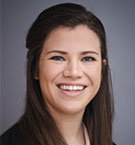 KG Kompa, MD
KG Kompa, MD
First-Year Clinical & Research Fellow
Hometown: Charlotte, NC
University: UNC Chapel Hill
Residency: Beth Israel Deaconess Medical Center
Favorite Food: Any pasta dish!
Favorite Hobbies: Reading, Knitting, Board Games, Travel
Fun Facts: I fenced in high school.
Where do you live: Jamaica Plain
Research Interests: Still discovering! I am interested in medical education.
Bio: I grew up in Charlotte, North Carolina and went to UNC Chapel Hill for my undergraduate. After graduating, I moved to Boston in 2018 to start medical school at Tufts and stayed here to complete internal medicine residency at Beth Israel Deaconess Medical Center. During residency, I was involved in research about counseling for patients on teratogenic medications. Outside of the hospital you can find me working on various knitting projects, collecting board games, and exploring new restaurants!
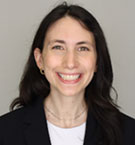 Noga Rogel, MD
Noga Rogel, MD
First-Year Clinical & Research Fellow
Hometown: Brookline, MA
University: SUNY Binghamton
Residency: University of Washington
Favorite Food: All types of soup - especially Pho
Favorite Hobbies: Hiking, 3D printing, and hoping to take up gardening in fellowship
Fun Facts: My older sister and I share the same birthday, 3 years apart. When I was in elementary school, I brought home two cockroaches from science class, and my parents graciously allowed me to keep them as pets in a fish tank. Please ask me what I named them if you would like a laugh!
Where do you live: Jamaica Plain
Research Interests: Applying genomics and transcriptomics to investigate immune dysregulation in autoimmune diseases
Bio: I grew up in Brookline, MA, and am so excited to be back on the East Coast after completing my internal medicine residency in Seattle, Washington. I was drawn to rheumatology after my first encounter with palpable purpura, ironically during my cardiology rotation early in intern year. My fascination with autoimmune diseases progressed throughout residency. During residency, my research focused on alternative splicing in Rheumatoid Arthritis neutrophils and I hope to pursue a physician-scientist career. Outside of the hospital, I love being outdoors, including hiking, biking, and playing (most) sports.
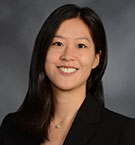 Elizabeth Wang, MD
Elizabeth Wang, MD
First-Year Clinical & Research Fellow
Hometown: Belmont, MA
University: Harvard College
Residency: Columbia University
Favorite Food: Cheesecake
Favorite Hobbies: reading, exercising, traveling
Fun Facts: I got Scuba certified in Boston Harbor
Where do you live: Downtown Boston
Research Interests: clinical research, myositis, vasculitis
Bio: I grew up in Belmont, MA and went to college at Harvard. I went to medical school at UCSF and completed internal medicine residency at Columbia. After residency, I worked as a hospitalist for 3 years in NYC. I am excited to be back in Boston for rheumatology fellowship! Outside of work, I enjoy reading, fitness, traveling, and spending time with family.
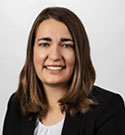 Molly Griffin, MD
Molly Griffin, MD
Second-Year Clinical and Research Fellow
Hometown: Rockport, MA
University: Harvard University
Medical School: University of Massachusetts Medical School
Residency: Beth Israel Deaconess Medical Center
Favorite Food: Burritos
Favorite Hobbies: Swimming, kayaking, snorkeling
Fun Facts: I worked with my father as an assistant carpenter in high school
Where do you live: Boston
Research Interests: Artificial intelligence and its use in building and analyzing large databases of rheumatologic disease
Bio: I grew up in Rockport, MA, and attended Gloucester High School before heading to Harvard University for my undergraduate degree in Organismic and Evolutionary Biology. I worked in environmental consulting in Washington, DC, before moving back to Boston and conducting research in cancer imaging and natural language processing. I attended University of Massachusetts Medical School and then completed my residency at Beth Israel Deaconess Medical Center. Outside of work, I enjoy spending time by the ocean, improving my baking skills, playing trivia, and exploring off the beaten path with my partner.
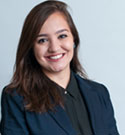 Raisa Lomanto Silva, MD
Raisa Lomanto Silva, MD
Second-Year Clinical and Research Fellow
Hometown: Salvador (Bahia, Brazil)
University: Escola Bahiana de Medicina e Saúde Pública
Residency: University of Pittsburgh Medical Center (UPMC)
Favorite Food: All things pasta, pesto, cheese, Brazilian pave dessert, or any other dessert with condensed milk
Favorite Hobbies: Going to the beach (even in cold weather), reading, cooking & baking (and eating!)
Fun Facts: "Jack of all trades, master of none" - passionate about traveling and (partially) learning new things (I've been through gardening, playing the flute, painting, pottery, learning different languages...)
Where do you live: South Boston
Research Interests: Equity in health care & social determinants of health
Bio: Born in the most beautiful city in Brazil, I completed medical school training back home with a one-year scholarship in France. I moved to the U.S. for a research fellowship at MGH in benign Hematology and fell in love with research. Afterward, I moved to Pittsburgh for my Internal Medicine residency at UPMC and discovered myself passionate about Rheumatology. During residency, I was involved in research with SLE and health disparities, and myositis and patient-reported outcome measures. Boston was the city where my husband and I got engaged, and the Esplanade is on our wedding invite - so I could not be more excited to come back to our "home away from home"!
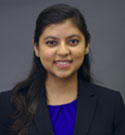 Avira Som, MD
Avira Som, MD
Second-Year Clinical and Research Fellow
Hometown: Houston, Texas
University: Massachusetts Institute of Technology
Residency: Barnes-Jewish Hospital (Washington University School of Medicine in St. Louis)
Favorite Food: Fettucine Alfredo
Favorite Hobbies: Dancing
Fun Facts: I've learned Hindi and am learning Korean from watching international dramas.
Where do you live: Roxbury
Research Interests: Lupus and social determinants of health
Bio: I was born in Virginia but raised in Houston, Texas. I moved to Boston for undergraduate where I studied chemical engineering at MIT. I then came to the Midwest and went to medical school and did internal medicine residency at WashU in St. Louis. During residency, I studied prednisone use in lupus patients living in socially vulnerable areas which really motivated me to pursue a career in rheumatology. I am excited to be back in Boston after 7 years (especially to try new restaurants) and start my career as a rheumatologist!
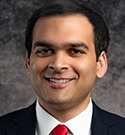 Aakash Patel, MD
Aakash Patel, MD
Graduate Assistant
Hometown: Suwanee, GA
Undergrad: Emory University in Atlanta, Georgia
Medical School: Medical College of Georgia in Augusta, Georgia
Residency: University of Alabama at Birmingham in Birmingham, Alabama
Favorite Food: chocolate chip cookies and peanut butter and jelly sandwich
Favorite Hobbies: Baseball, exploring new cities, hiking, running
Fun Facts: I caught a baseball at a major league baseball game
Where do you live: West End neighborhood in Boston
Research Interests: Clinal/epidemiologic, outcomes-based research in lupus nephritis
Bio: I was born and raised in Georgia where I attended college at Emory University and medical school at the Medical College of Georgia. Most recently, I completed my internal medicine residency at the University of Alabama at Birmingham (UAB). I developed an early interest in autoimmunity during college through my research experiences, and I am excited to be here at MGH for rheumatology fellowship! I envision an academic and translational/clinical research-based career. My interests outside of the hospital include hiking, running, attending sporting events, and exploring new cities.
Event and Member Photos
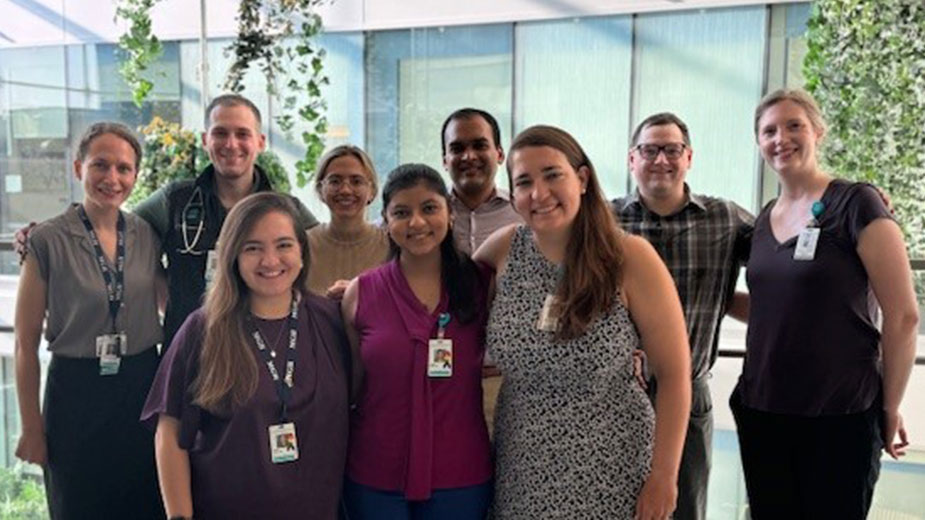
Current 2024-2025 Rheumatology fellows
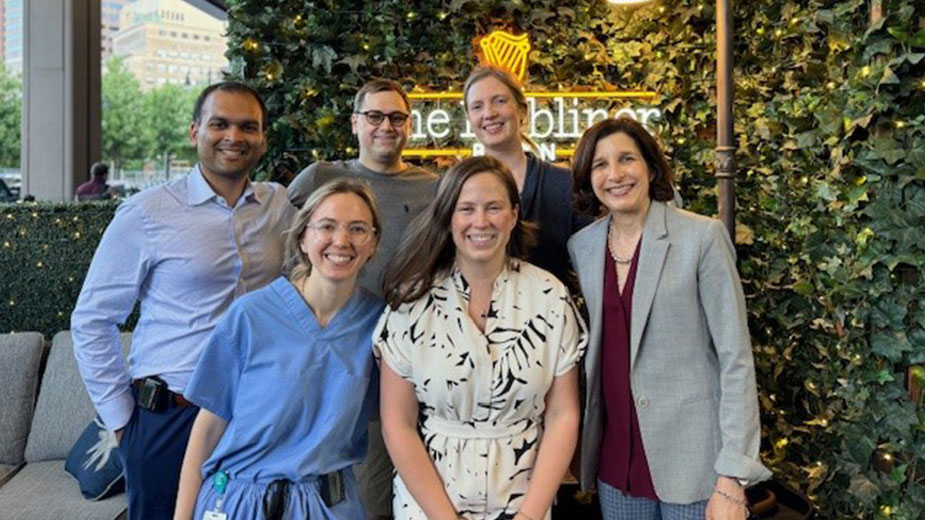
Fellows' moving on party, June 2024. Congratulations, Jacquelyn!

Fellows' moving on party, June 2024

ACR Knowledge Bowl Champions 2023
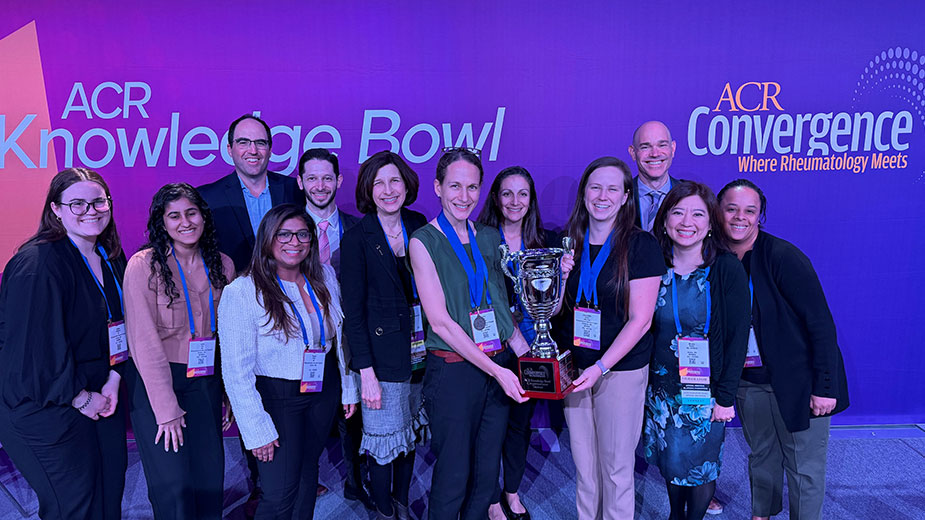
2023 ACR Knowledge Bowl
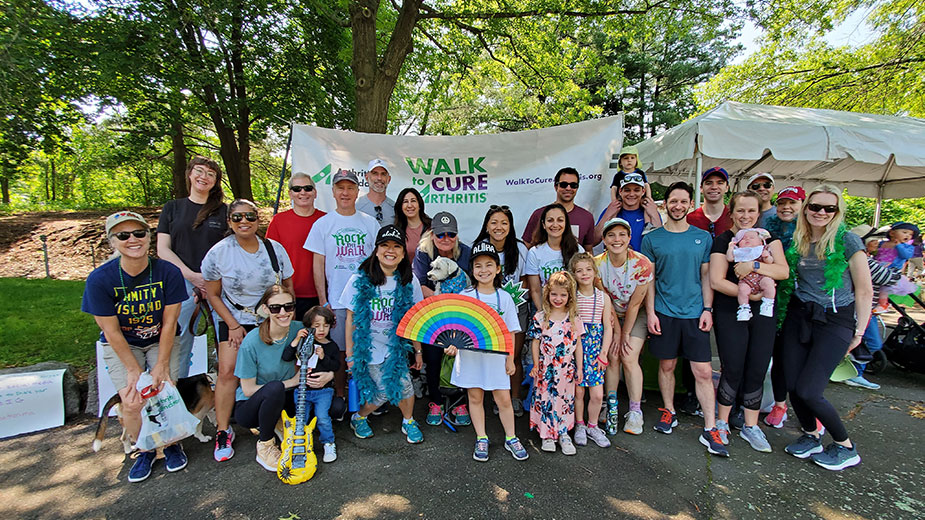
2023 Arthritis Foundation Walk
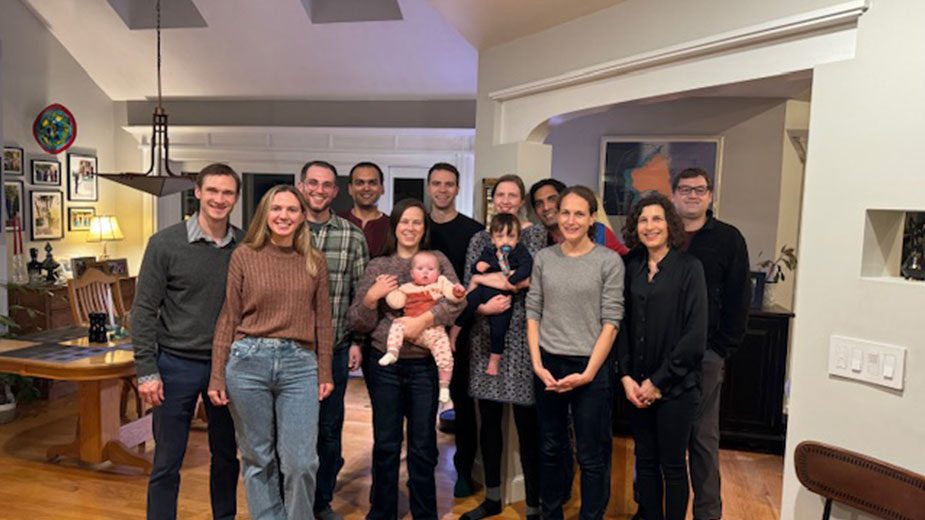
The "boards are past" party
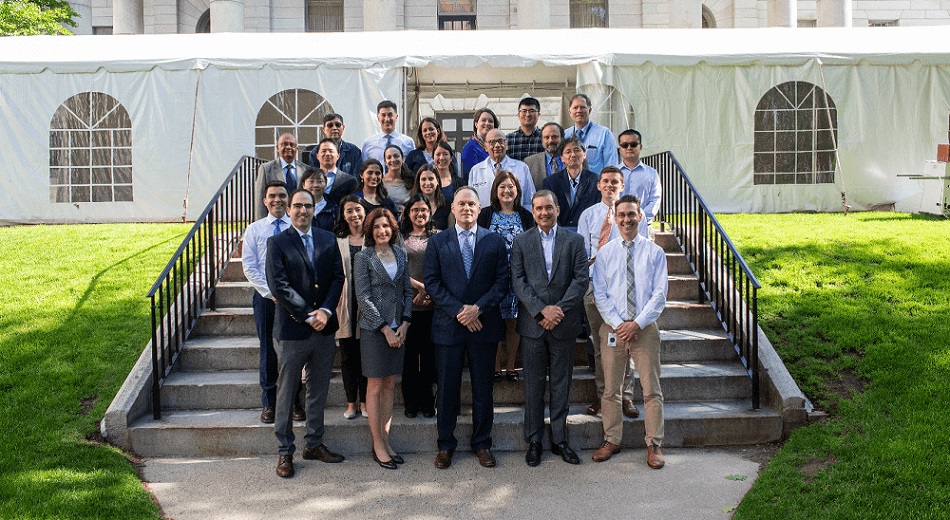
Faculty and fellows, Mass General Division of Rheumatology, Allergy and Immunology (2019).
How to Apply
The Mass General Rheumatology Fellowship Training Program uses the Electronic Residency Application Service (ERAS) Fellowship Applicant site for fellow recruitment.
Related Inquiries
For questions about the curriculum, contact:
Marcy B. Bolster, MD, Fellowship Training Program Director
For administrative questions, contact:
Lauren Baino, Fellowship Training Program Coordinator
Deadline
All fellowships begin July 1. We encourage applicants to complete their applications as early as possible. To apply, visit: ERAS Fellowship Applicant Site
Additional Information
Training & Employment Verification
Former faculty, fellowship alumni or residency alumni from the Department of Medicine can obtain verification of training and employment.
Graduate Medical Education at Mass General
Learn from residents, fellows and program leaders about the exceptional learning experiences offered at Mass General.
